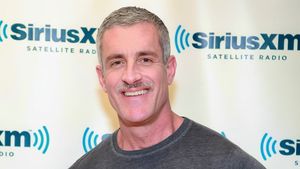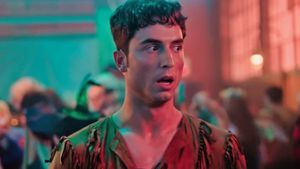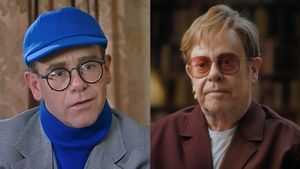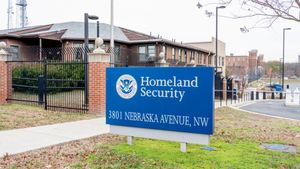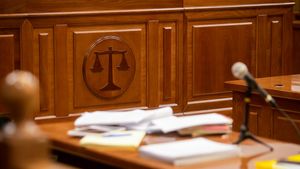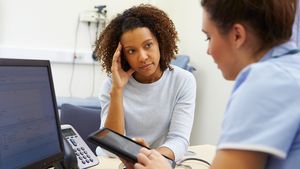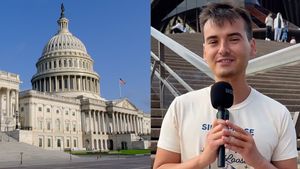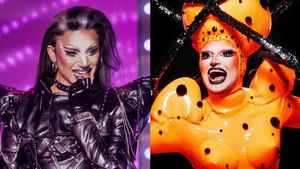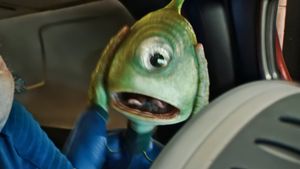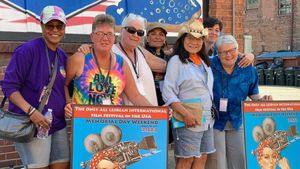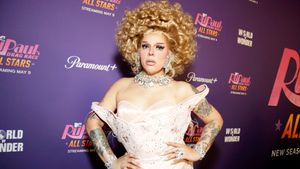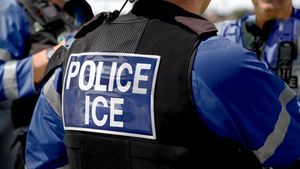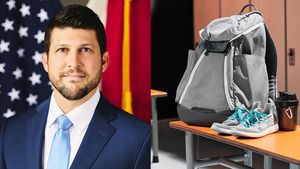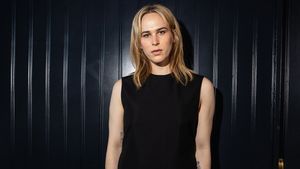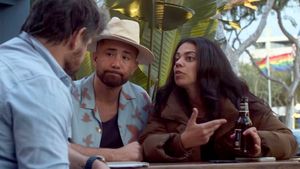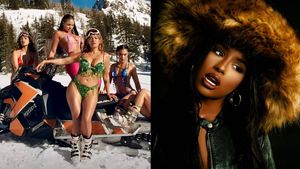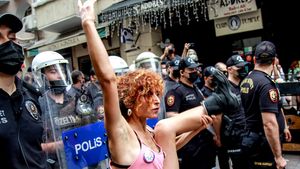In an industry that loves to pigeonhole talent, good luck putting Kerry Washington into a box. Since making her motion picture debut in Save the Last Dance and rising to fame with her critically acclaimed performance in Ray, the actress, now 32, has gone gay on film twice, dabbled in comedy with the Wayans brothers, played the tortured wife of Ugandan dictator Idi Amin in The Last King of Scotland, and faced off with the Fantastic Four.
Now, always one for a challenge, she tackles her heaviest role to date -- Marybeth, the male-to-female transsexual, heroin-addicted prostitute she plays to perfection in Life Is Hot in Cracktown. From her walk to her talk, Washington nails the part -- and it’s a sure sign her best roles have yet to come.
Washington sat down with Advocate.com to talk about the film, her time on the road stumping for Obama and how she found her femininity in paying trans.
Advocate.com: I have to say, after seeing Life Is Hot in Cracktown, I’m really looking forward to this -- you were superb.
Kerry Washington: Oh, my God, thank you.
Am I right that you were the first person to sign on to this movie?
I’ve heard that rumor -- it sounds familiar. I can’t dispute it, but I’m not exactly sure [laughs].
Well, hey, it sounds good, so run with it.
Right?
What drew you to playing Marybeth -- I have to say, that’s a challenging character, and one I think a lot of actors would likely run away from.
It’s one of those really funny, weird, I guess hopefully meant-to-be situations. I had an agent who fell in love with the project. She encouraged me to read it and I read it and was terrified. [Laughs] I sort of have a history of saying that I’m drawn to work that challenges me. I have, unfortunately, said that publicly a lot. So she sent me on this interview and I went to meet with Buddy [Giovinazzo, the director] feeling a bit nervous and ambivalent and not really sure what he wanted to do but knowing that I was really drawn to the writing. He was very honest with me and said that he wasn’t sure that I could do it. He really wanted for Marybeth to be a realistic trans woman and that he didn’t want to distract from the argument -- could this woman really be a trans woman? Having me play the role he thought might cost the film some of its authenticity, which clearly is the most important part of the film.
Absolutely.
So he actually ended up writing me the most beautiful rejection letter I have ever received in my life. I forwarded it to my agent and thought, My God. If ever I have to hear no, this is the way to hear it. But it’s that thing -- when you can’t have it, then you really want it. I started doing a little research and started forcing him to do some research about trans women and really looking at these women. We both kind of realized that it’s more than realistic that I could play this role, because there are trans women in the community who are clearly women. What’s challenging about being a trans woman is that you’re born a woman yet there’s a section of one’s biology that betrays that truth. And so there are times when you meet and see trans women who have been graced with the ability to conquer that denial, where you’re just very aware of the truth of their identity as women. So we went for it.
More on next page...
\\\
(continued)
It’s very clear you’ve done a ton of research -- you speak very eloquently about the topic. Was this a crash-course education for you in trans issues, or were you familiar with the topic before?
It’s interesting -- when I was in high school, I was really, really lucky to be able to join this theater company in New York City ... and it still exists, actually, it’s called Nitestar. It’s affiliated with St. Luke’s Roosevelt Hospital. The company started really at the beginning of the AIDS epidemic. We used to write these very open-ended scenes about safer-sex issues, drug abuse, homosexuality, living with HIV, loosing your virginity -- the full range of issues for teenagers to be working with around sexuality and safer sex. The company became the national model for this kind of theater in education work through the Centers for Disease Control. We used to go to different schools and community centers and perform these open-ended scenes and the audience would interact with these characters at the end of the show. First of all, I got the best training as an actor in those years because you have to know your character so thoroughly to be able to improvise with an audience of 300 after a performance.
But I also became a peer educator -- separate from the theater work, I used to work in the community and at the hospital. So I worked very closely with a lot of people in the gay, lesbian, bisexual, and transgender community. It wasn’t as if this was a community completely unknown to me, but the specifics of the transgender experience ... that was very new. I worked with a brilliant and beautiful woman by the name of Valerie Spencer who guided me through a lot of this and who was just fundamental to my ability to play this role. There’s also a great book that I read called Transparent, which is also a book about raising a transgender adolescent, that was really, really vital for me. I’m sort of a person who thrives with research.
Are you the one who lays out all of your paperwork on the floor and starts taking notes?
I do [laughs]. And also, Buddy was great in allowing for Valerie to be a part of that process in terms of keeping things authentic. It was a very, very collaborative experience.
Tell me a little about the voice -- because clearly, hearing you on the phone right now and then watching the film, it’s significantly lower. I remember after seeing Transamerica and talking to Felicity Huffman, she said once she found her voice, she couldn’t get out of it because she didn’t know if she could find it again.
Right, right, right.
Did that happen with you?
I found that it changed a lot, actually, which -- and you’ll see in the film it changes a bit ... just in some of the work that I did, you’ll find that can happen to somebody who uses substances to that level ... there are different levels of awareness. The thing that I would say was similar to that for me, actually, was the walk [laughs]. It’s funny -- I feel like I learned so much about what it is to be a woman playing this character, because I think I take being a woman for granted, so I don’t think about walking in full appreciation and celebration of my femininity. I just don’t. But if I was born without the biological confirmation of what I know I am, I would be much more committed to celebrating my gender in my walk. There were all these ways of standing and walking and being that were more womanly than I had ever experienced in my life. It was great -- it was really amazing to just be a lady, because I’m sort of the result of this post feminist world where so much of what I do and think and feel is at least attempted to be done on a gender-neutral basis.
I didn’t realize until I started doing some research -- you campaigned really hard for Obama. You spent a lot of time on the trail. What was that experience like for you? It had to be somewhat surreal.
It was pretty incredible. I guess I was really lucky, because I have this sort of hybrid personal history in that I grew up in the Bronx and then I went to Spence [an exclusive private school] in New York, so they realized very early on that they could send me to a tea for the ladies' society and they could send me to the historically black university and so, once I got on the road, that was it [laughs]. Soccer clubs in the suburbs to black churches. I was covering every demographic possible. I was really excited to do it.
I went to parts of the country I’ve never been to before. I literally had never been to Tennessee, had never been to Arkansas, had never been to Texas, and so here I am, going to these places -- and going deep into communities and meeting all different kinds of people from different socioeconomic backgrounds. It was just amazing and really, in a way, restored my faith in America.
More on next page...
\\\
(continued)
Which I think a lot of people needed right about then.
Yeah, yeah! I’ll be honest with you. There were places where, I looked on the schedule, and I was like, “That scares me.” [Laughs] “I’m a black woman going there? Why are we doing that?” [Laughs] But it was great -- it was just great.
What’s your take on his job so far? Are you happy?
I am -- you couldn’t pay me to do the job [laughs]. I would say for the first 100 days [this interview took place in mid May], I think it’s pretty good. He has a huge task ahead of him to fix all of the problems that were created ...just to fix the problems that have been caused in the last eight years, never mind the issues that existed before that. So, yeah, I don’t envy him, but I do support his journey.
You’ve played gay at least twice -- that I know of. You’re carving out quite a little gay niche for yourself in terms of a following. Is it that the characters interest you? Are you particularly drawn to those characters?
You know, I’m just drawn to real people, and I think most actors are scared to play real people, so I’m privileged to play characters sometimes that I think other actors are nervous to play. I don’t see my job as a job about playing it safe. I think the task in front of me is to tell honest stories about humanity. So I get to do what I think other actors are sometimes reluctant to do.
Kristin Chenoweth was talking about her planned Dusty Springfield biopic and said that she would love to have you play her lover. That’s got to be flattering.
Oh, yeah, especially coming from her -- she’s the cutest human being on the planet. She knows I’m a huge fan of hers and she actually is sweet enough to have mentioned it to me beforehand. She’s like, “I’m going to be talking about it, so I just want you to know.” I adore her and I think she’s massively talented, so yeah -- and what an important story to tell.
Well it’s out there in the universe now, so we can hope.
Exactly.
How many languages do you speak?
OK -- I don’t know where this got started.
So is it true, or not -- that you speak eight languages?
No, it’s not true at all. I speak acceptable English, I think -- on a good day. I speak fluent Spanglish. I speak very little French.
Your accent is great, though [Kerry speaks French in Life Is Hot in Cracktown].
Thank you. I’m learning French because when I became a L'Oréal girl I started spending more time in Paris and in Cannes every year, because L'Oréal pays for the festival. So I bought my Rosetta Stone because I wanted to learn more, and I try to learn more when I’m there, but I can’t hold a conversation in French -- I can fake it really well. If you count the Bronx as a world unto itself, then that dialect may count for something [laughs].
Yeah, so the interview that says you speak Russian and Swahili is a lie?
That would be so hilarious. It’s a fun rumor but -- sadly, sadly -- not true.
More on next page...
\\\
(continued)
So then, what is an interesting fact about you ... something people might be surprised to learn?
I think maybe that I’m so silly. My family thinks it’s very strange that I do so much drama in my career because I’ve always been the clown of my family.
Can I ask about this movie you just did with Annette Bening and Naomi Watts [Mother and Child]?
Yes, definitely.
It sounds like a thrilling career experience.
Completely fulfilling emotionally and artistically.
Tell me a bit about it -- I guess it isn’t coming out until next year.
Right -- it might do a festival or two before then, but they’re still figuring it out. It’s Rodrigo García, who also wrote a beautiful film called Nine Lives a few years ago. He’s fantastic and brilliant and he writes women as if he was one in a past life. The film is about three different women on their varying journeys dealing with motherhood -- either being a mother or wanting to be or coming to terms with what motherhood means. The stories are related in some way at the end of the film. It’s just beautiful. Every once in a while, I get really lucky to read a script likeCracktown or Mother and Child where you’re like, “Oh, my God.” It takes your breath away.
And then on the complete opposite end of the spectrum for you, Bill Maher -- you’ve done his show a few times. Have you always been so politically savvy?
My family is very politically aware -- dinner in my house has always been a place to discuss the sociopolitical realities of the world. As kids we were always encouraged to participate in those discussions.
I’m assuming you grew up pretty liberal.
Yeah, but, it’s interesting -- to varying degrees. I would say my mother is a lot more progressive than my dad. My mom is a teacher; my dad’s a real estate broker who served time in the military. They’re both definite, committed Democrats, but there’s a wide range of ideas in my household and in my family.
Was it strange for them to see you play gay on film?
Well, I mean -- I think it’s going to be weird for your parents to see you get finger-fucked on a kitchen counter regardless of their politics [laughs].
This is true -- I’m glad you went there and I didn’t.
Regardless of your politics, that’s weird. So yeah ... that’s what it is. But I think ... the other interesting thing is I come from a mixed-race background. My mom is mixed-race, and so in her house growing up, the civil rights movement was a heated time because my mother is the darkest of the seven kids, but she has siblings who don’t identify as African-American. So my family has always been a rich atmosphere for diversified ways of thinking about identity and politics and race and gender. So we kind of go there as a family.
When people come to my house, they look at pictures and go, “Who is that? Who is the Asian child sitting on your lap?” I have a cousin who is half Dominican, and then he married a woman from Thailand, and their kids are cousins who I adore. People kind of look at my Christmas pictures and go, “I don’t understand” [laughing].
It’s a good example for what makes a family, because it isn’t always cut-and-dried.
You’re right. Exactly.



















































































